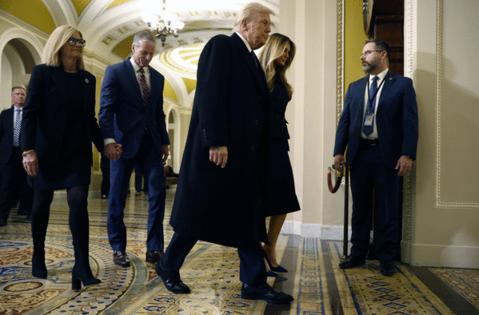Matthew Yglesias: Trump and Republicans are avoiding the hard questions
Published in Op Eds
One bill or two? That’s the question currently obsessing Washington as President-elect Donald Trump fails to decisively resolve a tactical disagreement between House and Senate Republicans.
John Thune, the new Senate majority leader, wants the party to pass two bills through the filibuster-dodging budget reconciliation process: The first would involve spending additional money on defense and immigration enforcement, offset by revenue derived from issuing more permits for oil and gas exploration. That would allow for a second bill focused on extending Trump’s 2017 Tax Cuts and Jobs Act and offsetting the cost with spending cuts. House Speaker Mike Johnson, by contrast, wants to cram all these issues together in one “mega-MAGA” legislative package.
The most important thing to know about this archetypal inside-the-Beltway dispute is that it doesn’t really matter — and is papering over several more significant disagreements.
The biggest one of these, by far, is whether to make the Trump tax cuts permanent or merely extend them by a few years. Under budget reconciliation rules, permanent tax cuts need to be offset by permanent spending cuts. For the TCJA, this will be challenging. Repealing all of the Inflation Reduction Act’s clean-energy spending, for example, would save more than $800 billion, which is a lot. But it doesn’t come close to covering the full $4 trillion cost of making TCJA permanent.
What’s more, to secure the support of critical House Republicans from New York and California, Trump has promised additional tax cuts in the form of a more generous state and local tax deduction. And during the campaign, he made big promises to eliminate taxes on tips, overtime pay and Social Security benefits, as well as occasionally suggesting he wanted even steeper cuts in the corporate income tax. Any of that would add trillions to the overall price tag, which would require huge offsetting spending cuts.
So how does Trump make good on all these promises? Let me offer you another nugget of inside-the-Beltway insight: He doesn’t. Some of the promised tax cuts aren’t going to happen. And of the ones that do, most will not be made permanent, so they won’t have to be offset with spending cuts.
The questions, of course, are which tax cuts and how much they amount to. We are talking about literally trillions of dollars of ambiguity here. And yet, beyond energy, the only thing Republicans have discussed in concrete ways is trying to save money through expanded work requirements for Medicaid.
Research indicates that such requirements do not increase labor force participation. But work requirements do reduce enrollment, both by cutting off some genuinely unemployed people and, more important, because the complexity of verifying eligibility causes some people to disenroll. So while this would save some money — at the cost of denying some people health care they need — it’s a relatively modest cut in the scheme of things.
Are Republicans interested in another attempt, like in 2017, at cutting health care programs? They’ve spent the past several years not answering that question. This whole “one bill or two” debate seems engineered in part to help them avoid it further.
Beyond the issue of how to offset the tax cuts, there is another not-insignificant question: What are the actual policies — about immigration, defense or energy — that Republicans would like to enact into law?
Part of the interest in the two-bill strategy is that Senator Lindsey Graham, who chairs the Budget Committee, supports a large increase in military spending. Senator Roger Wicker, who leads the Armed Services Committee, wants to boost defense spending to an eye-watering 5% of GDP. Meanwhile, a small (but not trivial) minority of Republicans spending hawks has been complaining that current levels of military spending are too high.
A similar dynamic is playing out on immigration policy. It’s easy for Republicans to agree on more funding for border security. But the more detailed the discussion gets, the more consensus tends to break down.
There’s already been significant intra-MAGA infighting over H-1B visas. There is also the Republican schizophrenia over the federal E-verify system, which is designed to make it harder for employers to hire workers without proper visas. In practice, red states that have already adopted such laws tend to enforce them pretty weakly, since they pit Republican antipathy toward immigration against Republican fondness for business. On the federal level, every time House Republicans have gotten close to passing a sweeping E-verify mandate, they end up removing it at the behest of agricultural interests, which rely on illegal workers to keep the food system running.
Most of these issues can (and presumably will) be addressed by simply scaling back conservative ambitions. But there is an important conceptual question — do tax cuts need to be offset with spending reductions? — that cannot be waved away. Trump decided against offsetting his tax cuts in 2017, and so did George W. Bush in 2001 and 2003. So it’s not difficult to predict where Republicans will end up in 2025. Still, more than one bill or two, Republicans need to decide where they stand on this question.
____
This column does not necessarily reflect the opinion of the editorial board or Bloomberg LP and its owners.
Matthew Yglesias is a columnist for Bloomberg Opinion. A co-founder of and former columnist for Vox, he writes the Slow Boring blog and newsletter. He is author of “One Billion Americans.”
©2025 Bloomberg L.P. Visit bloomberg.com/opinion. Distributed by Tribune Content Agency, LLC.




























































Comments